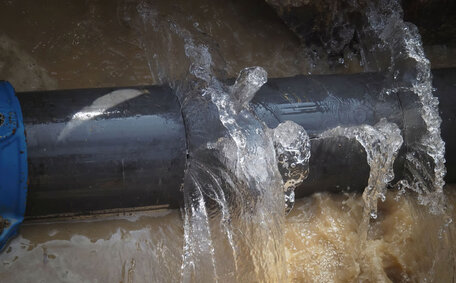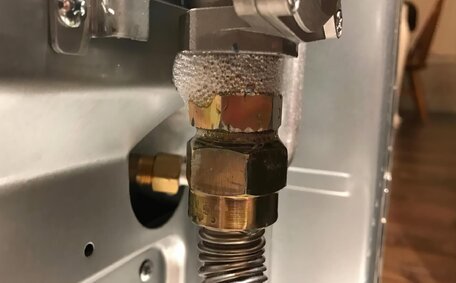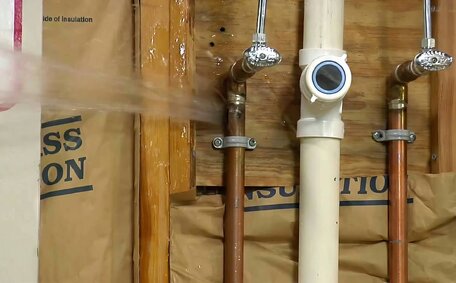Common reasons for gas water heater failures
Several factors can prevent your instant gas hot water system from providing sufficient hot water:
Pilot light going out
One of the most common culprits disrupting your hot water supply is a failure in the system’s ability to heat water, often requiring you to check the pilot light functionality. A common problem with instant gas systems occurs when the pilot flame extinguishing due to strong drafts, gas pressure fluctuations, dirt accumulation, or a malfunctioning thermocouple, resulting in no hot water.
A frequently extinguishing pilot light signals a need for repairs, a typical issue with instant gas hot water systems.
Sediment build-up
Over time, sediment and water hardness minerals, especially in the dip tube, can accumulate and hinder your hot water heater’s performance. This buildup insulates and reduces heating efficiency; thus, annually flushing your storage tank is crucial for maintaining optimal performance.
Failing thermostat
The thermostat and its accompanying heating element work together tirelessly to ensure your water remains at the desired temperature. A malfunctioning thermostat set incorrectly can be a common instant gas hot water issue requiring professional replacement, which only takes a few minutes.
A malfunctioning water heater can lead to an insufficient hot water supply, causing significant discomfort and inconvenience at home. It’s clear there’s discomfort when the water temperature is inconsistent, manifesting through problems like overheating or your hot water working improperly.
Leaking valves/tanks
Leaking pipes connected to your taps can compromise the performance and integrity of your water heater. Small leaks around valves and fittings can lead to major issues if left unaddressed.
Keep an eye out for puddles under the tank, signs of rust, and changes in water pressure.
Malfunctioning gas valve
A faulty gas valve could inadequately regulate the flow, potentially cutting off gas prematurely, leading to less effective heating air and resulting in issues. The valves inside your system can cause wear and tear, not just due to age but also because of problem your sediment clogs and electrical complexities, especially when pilot light maintenance is overlooked. Faulty components can lead to a scenario where there no gas is flowing to ignite the pilot or heat the water.
Troubleshooting ignition issues
Check the gas supply
First, for gas electric water heaters, confirm that the power supply is stable and the circuit breaker is functioning correctly to avoid operational issues.
Ensure all gas lines are open before attempting to relight the pilot. Exercise caution; avoid smoking or creating sparks during your inspection and call your gas company if you suspect a leak.
Inspect the flue
Clear flue pipe passages are essential; blockages may require shutting off the gas supply to prevent dangerous gases and loss of hot water. Employ a flashlight to check for obstructions like debris or birds’ nests and verify that no tripped circuit is affecting your system. If you encounter an obstruction, contact your local provider immediately, especially for issues with your water system’s flue.
Test the gas control valve
Problems with the gas control valve or thermocouple often cause your water heater to shut down. Examine your system’s manual for guidelines on water heater problems to determine if your hot water working properly or if straightforward diagnostic steps can identify issues with these components. Gas valves often need professional replacement.
For instance, in certain models of gas water heaters within your house, the pilot will stay lit only if the reset button is held down, ensuring the water heated adequately, indicating potential problems with your unit.
When to call a plumber
If you find yourself asking, 'Do I smell gas?' or notice flue blockages, or the pilot won’t re-ignite, call in a professional with the expertise to handle gas hot water systems. Attempting DIY repairs without proper know-how could prevent gas safety measures from working correctly, risking leaks, fire hazards or exposure to dangerous gases like carbon monoxide.
Ignition components often require specialised tools and expertise. Our experienced plumbers can fix your hot water expediently and safely, troubleshooting even the most perplexing ignition issues in your unit.
Detecting and repairing water heater leaks
Signs of a water heater leak
There are a few key signs that indicate your water heater may be leaking:
- Puddles of water around the base of your gas hot water heater
- New rust spots on the tank exterior or fittings
- A noticeable decline in water pressure might mean you’re getting less more hot water than expected from your heater
- Elevated humidity, or water from the hot water tank could be leaking onto the floor
Minor leaks can worsen, impairing efficiency, so address them speedily to mitigate the risk of severe damage later on.
Finding the leak source
Begin by thoroughly inspecting connections, particularly around the temperature relief valve, in your hot water system. Inspect around your temperature relief and pressure relief valve and both inlet and outlet pipes for any signs of dripping or accruing corrosion.
Also, examine the anode rod compartment and water pipe inlets for any signs of leaking. Employ a torch to visually scout for potential hot surface indicators of any drips or moisture, particularly in areas vital to your water heater.
Repairing minor leaks
For non-critical repairs like minor leaks at fittings, a simple turn your wrench and secure approach can help, unless the issue stems from components that are too small and need replacing. But take care not to apply too much force when tightening fittings made of plastic or copper.
Utilise thread seal tape, which can also reinforce joint security and ward off your potential leaks, to ensure any leak-prone threaded connections stay tight, especially when you turn hot water tap. This ensures you maintain a sufficient hot tap water supply and prevents further weakening of your water fittings over time. Be sure to use plumbing tape rated for potable water when sealing water heater components.
What if there’s a tank leak?
Leaks from the tankless water system itself, resulting in a steady flow of cold water, might signal the need for a new system to meet your hot water needs more reliably. At this point, it may be financially sensible to upgrade to an electric hot water system, enjoying the many advantages it offers over traditional models. rest assured, our team specialises in not only new water heater tank installations but also safely dismantling your old system.
For complex malfunctions, seek a professional plumber for prompt diagnosis and repair. We have the tools and know-how to diagnose problems and recognise when a tank might need replace for optimising performance. This prevents wasted time and money on temporary fixes for critically compromised equipment.






